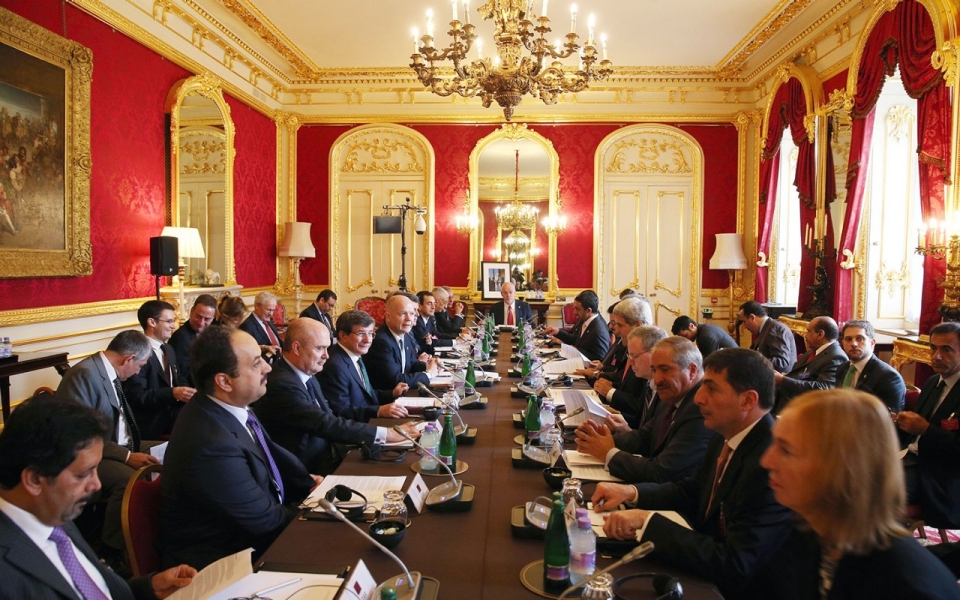 Figure 1 Arab and Western foreign ministers meet at Lancaster House in London to discuss Syria’s civil war on Oct. 22, 2013[1].
Figure 1 Arab and Western foreign ministers meet at Lancaster House in London to discuss Syria’s civil war on Oct. 22, 2013[1].
The Syrian crisis started in March 2011, when a group of civilians protested asking for a reformation and a change. The Syrian regime faced these protests with hostile acts using tanks and warplanes, as a result, the protests spread all over the country and led to a civil war that is still going on hitherto. Millions of Syrians became IDPs and refugees. The international community through the international agencies and organisations interfered to help the civilians and empower them to have more resilience in their own areas.
Taking into account the aforementioned, it would be hazardous to carry out an assessment study for development in any targeted sector in conflict areas, specifically, if the barrels’ bombs are indiscriminately targeting populated areas as it is happening nowadays in Syria. However, to reach a broader understanding of the various sectors that need sustainable development, perhaps donors and international organisations may adopt a new developmentality, it might start with inviting the experts at the organisations and institutions of the targeted sectors from the conflict areas to a reverse visit to the countries in which policy preparation processes are taking place, listen to their recommendations, and engage them in drafting these policies that they themselves will implement in their homelands, or, the least to make regularly video conference calls with them.
The necessity of applying a participatory approach via involving the implementers in drafting policies and proposals from the beginning will avoid countless risks to all parties. Countless meetings on Syria were held without inviting any Syrian to speak, (See Figure 1.) the following elven states met in London in 2013 without inviting any Syrian (Britain, Egypt, France, Germany, Italy, Jordan, Qatar, Saudi Arabia, Turkey, the United Arab Emirates and the United States).
It is worth mentioning that during the Syrian conflict the rule of law role was diminished to a large extent, howbeit, Individual free choice in our contemporary world is very important, likewise, the ability of societies to make fateful decisions according to what is best for all its members is crucial. Furthermore, in the absence of state institutions that respect the values agreed upon in constitutions and sign memorandums of understandings with international actors led to reliance on ad-hoc authorities that don’t share the same values that are agreed upon between the donors and Implementers. Thus, in light of the acceleration taking place in the era of globalisation, the participatory and the capability approach might be the most relevant approaches to be adopted by the donors, Klein explains how Amartya Sen defines Development in the context of capability approach as “a process of expanding the real freedoms that people enjoy to lead the lives they have reason to value … Sen’s approach has influenced the development discourse and it provides a means of building a bridge between those working in international development organisations and researchers in academia” ( Klein, 2010, p108). I have experienced some risks myself during my work in the past ten years at international and local organisations in the development sector, I will discuss some of them in the following paragraphs.
Risks I have experienced during my work on Syria
– Risk of doing inadvertent harm: Do no harm principal was not that much considered by the donors in Syria as they provided grants to the nongovernmental organisations to provide the same services provided by the profit sector, rather, reliance ought to be on both, the profit sector as a service provider and on none profit sector as organisations to do communications, monitoring and evaluation. The aforementioned process caused a destruction and closure for the majority of the private sectors (I had to close my languages learning centre in southern Turkey, when the donors granted the NGOs to start courses for teaching languages). The risk will be crucial when the donors withdraw, we will end up of having approximately of 20,000 to 25.000 employees of the non-profit organisation sector are unemployed, therefore, they will have to go to work in the private sector which has been bankrupted and destroyed as a result of the irresponsible policies of the donors who excluded the variant local partners in building their policies.
– Risk of opacity: Not disclosing the budget transparently to the implementers, specifically the components that are allocated to the administrational core fund. Transparency prevents accusations of corruption. Nowadays, unfortunately, the prevailing description about international organisations that get grants from donors to work with local organisations and beneficiaries in Syria is “leeches”, therefore, I think greater transparency will necessarily lead to a greater engagement and more fruitful results.
– Risk of miscommunication: Neither speaking the Language of the targeted areas nor learning it by the international experts during the projects’ implementation, notwithstanding the duration of the conflict is reaching eleven years, it can be seen by the local stakeholders as an indication of not taking the assigned role seriously in addition to the inability of creating new relations with new beneficiaries is gigantic on the basis of Less communication will necessarily lead to less coverage and less impacts as the number of the expected meetings with locals who only speak their own language will be diminished in the absence of interpreters.
– Risk of sexual harassment: “the sexual exploitation by humanitarian workers at distributions was commonly cited by participants as a risk faced by women and girls when trying to access aid” Voices from Syria report.(2017, p30). preventing harassment against female beneficiaries is a big challenge for all parties. For a professional response to this challenge, I recommend the following: all employees must sign a code of conduct and attend a training workshop to explain it, there must be clear announcements on billboards next to the main entrance about the complaints’ methods for all beneficiaries, a committee of three members of the beneficiaries headed by the Mukhtar of the targeted area to monitor the services provide, in addition to use ICT4D such as setting a camera connected to Internet in the offices that provide services with the possibility to have access on it by donors, and developing an application that allows all beneficiaries to have access on it, they could notify the donors instantly after receiving the aid if any exploitation happened, and it might have a tracing contact features.
In a nutshell, the application of the participatory and capability process will take longer time and more efforts from the relevant international donors when they draft a policy. However, it may lead to more effective results and less opposition to the implemented projects, finally, using ICT4D is indispensable and necessary to implement development programs in light of the ongoing conflicts.
References:
- https://www.humanitarianresponse.info/system/files/documents/files/2017-12_voices_from_syria_2nd_edition.pdf
- ICT4WHAT?-Using the choice framework to operationalise the capability approach to development, Journal: Journal of International Development, : 2010, ISSN: 1099-1328
- [1]http://america.aljazeera.com/articles/2013/10/22/dissension-in-ranksasfriendsofsyriameetinlondon.html

